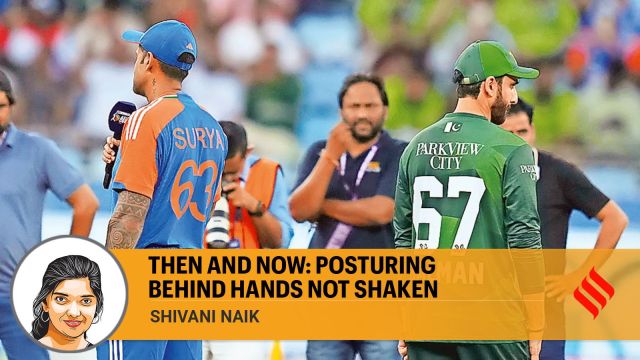
From a Test series in England to the T20 Asia Cup in the Emirates, the utterly inconsequential ‘handshake’ between players has monopolised headlines in Indian cricket.
When Suryakumar Yadav refused to fake a smile and appear friendly towards the Pakistan team — that is, shake hands — the opponents raked up gestures that mocked alleged military hits. If sensitivities are so far gone and numbed in this hostile environment between the two neighbours that they can’t tell wars and video games apart, the Indian decision to not shake hands too surrendered subtlety, after it first struck.
It stopped being an impactful statement and ceased to be an enduring image the moment Surya needed an entire press conference after beating Pakistan the first time to explain and underline why he had refused to shake hands. Not missing the point exactly, but embellished so starkly that it lost its assured poise.
Earlier, Ben Stokes raised a ruckus when Ravindra Jadeja and Washington Sundar wanted to get to their Test centuries at Old Trafford. How was this conveyed? Stokes stretched his arm, goading the duo to call off the match after a draw was imminent, and they refused to shake the said hand. It precipitated some bad blood.
India and handshakes just don’t vibe, you would come to think.
England — with its archaic manners dragged into this sport, and blatantly postured pretences — has been denied handshakes before.
In 2008, New Zealand eked out a 1-wicket win at the Oval, and slammed the dressing room door in Paul Collingwood’s face. England had pettily refused to withdraw a run-out appeal against Grant Elliot despite a mid-pitch collision in a tight Test. Collingwood became contrite and New Zealand’s Daniel Vettori calmed down after venting some expletives from the balcony. There is little recollection if hands were shaken in the aftermath.
Two years earlier, at the same venue, umpire Darrel Hair gifted England 5 runs after he crinkled his nose at the misshapen ball. Inzamam ul Haq, at whose team the accusations of tampering were directed, did nothing. Forget shaking hands to end the match. Pakistan, full of righteous rage, didn’t bother jogging down to the field after tea. They stood the English batting pair up, and forfeited the match altogether.
The most notorious no-handshake incident had started with a captain being called ‘fat’ on January 20, 1996. Australians had made Muttiah Muralithatan’s life wretched that Christmas, hinting at ‘chucking’. And then, the umpires started no-balling him. Ian Healey then got unclassy and called Arjuna Ranatunga ‘fat’. Batting while being unwell, the feisty Sri Lankan captain asked for a runner, and the Aussies protested saying the “slowest runner” was being unfairly replaced by “lightning fast” Sanath Jayasuriya.
It cascaded into one of the earliest iterations of ‘no shaking of hands’. Shane Warne had been hurling abuses and the racist undertones were hard to miss. A furious Ranatunga found the treatment meted out to them abhorrent and instructed the Sri Lankan team to not shake hands with Australia after the match.
Australian captain Mark Taylor will always wonder how much of that determined stand taken by Ranatunga (with hands clasped nonchalantly behind his back), fuelled Sri Lanka’s World Cup victory two months later. The Aussies were forced to shake hands with their victorious conquerors in the finals at Lahore.
One of the tragi-comic rivalries of recent years is the Sri Lanka-Bangladesh Naagin Derby. The rivalry brimmed over during the 2023 World Cup match when Angelo Mathews was timed out. The bitterness saw them vehemently avoiding the handshake.
Handshakes didn’t always border on this make-believe brinkmanship. Richie Benaud’s Aussies had been classy, welcoming Frank Worrell’s West Indies to the top bracket of cricketing nations, and shedding off the Empire yoke, after the first tied Test in 1960 by shaking hands. Andrew Flintoff and Brett Lee shook hands after a thrilling but tiring final day of Ashes at Edgbaston in 2005, where the heartfelt handshake looked authentic.
It’s why Kapil Dev, not particularly setting store on these frivolities in the first place, backed Suryakumar Yadav. He told Sports Today he found the Pahalgam terror attack “terrifying and horrible”, and was aligned with the sentiment that Pakistan needed to be told they can’t keep disturbing Indian peace again and again. SKY’s stand was authentic. It conveyed unhappiness adequately. The Indian triumph that played out on TV in front of the world, also didn’t need a token trophy, he said.
But that’s where the posturing should have stopped. “You can’t linger on this. You have to finish, move on. Let the government do their job. Let the politicians do their job. Our job was to make an impact, or make a dent, which the Indian team did… winning matches and after that showing that this type of behavior from Pakistan, we won’t like it. But now, move on,” he said of stewing in perpetual hatred.
Shaking hands in cricket hadn’t even been de rigueur when they played, according to Kapil. “Shaking hands is not a big thing. Don’t make a bigger issue than that,” he said. A withdrawn hand had sufficed for Surya. Incessantly talking about how they were not talking, however smacked of an overkill. The lasting effect: hands not shaken, hearts barely stirred.
The writer is Assistant Editor, The Indian Express